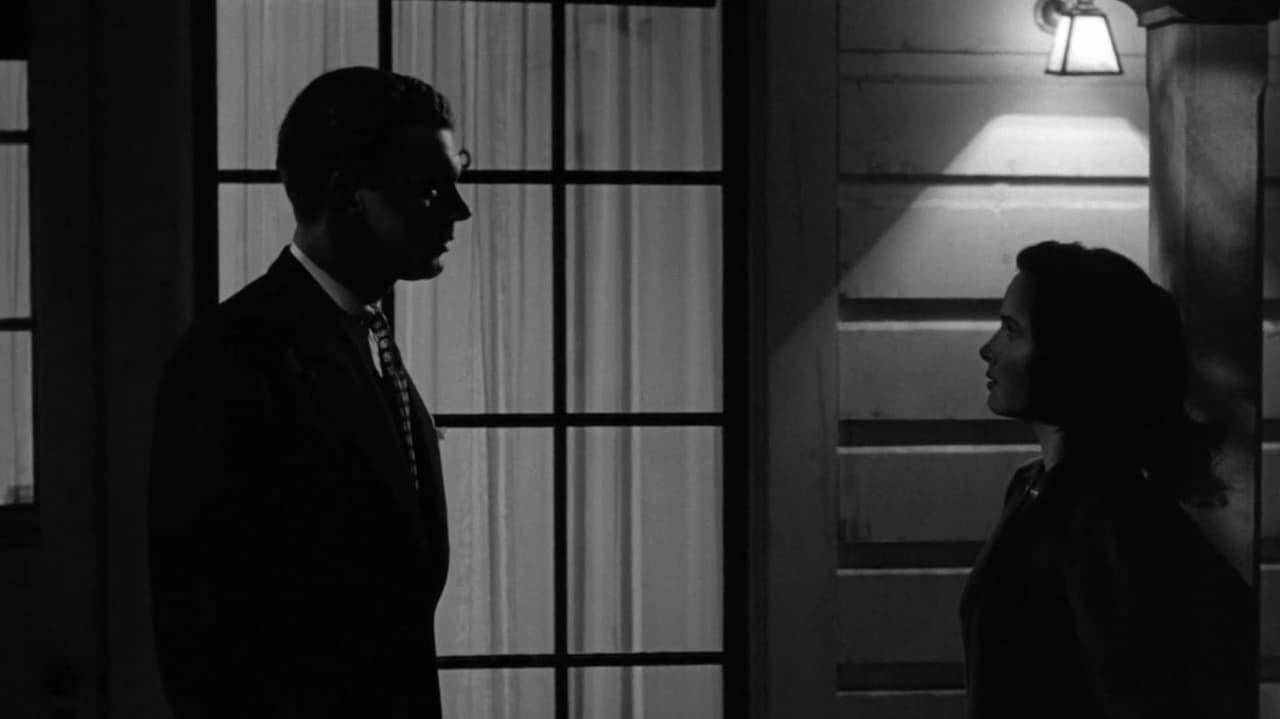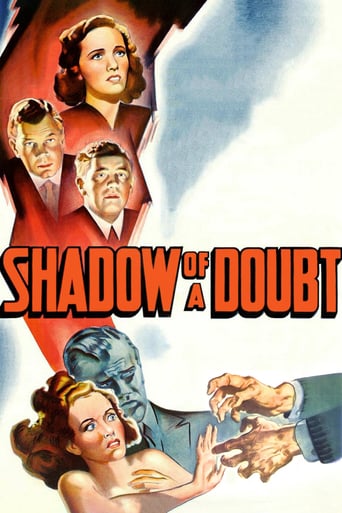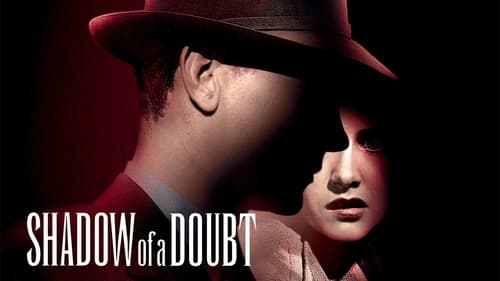



Self-important, over-dramatic, uninspired.
Brilliant and touching
It's not great by any means, but it's a pretty good movie that didn't leave me filled with regret for investing time in it.
View MoreUnshakable, witty and deeply felt, the film will be paying emotional dividends for a long, long time.
View More"It (the world) goes crazy sometimes." Jack Graham (Macdonald Carey)Although "Shadow of a Doubt" opened at theaters in January of 1943, it was made in 1942, a year in which much of the world had found itself entangled in the horrific violence and uncertainty of a major global conflict, World War II. Considering that the same conflict played such a prominent role in Hitchcock's other films from the same period (Foreign Correspondent, Saboteur, and Lifeboat), I do not believe that the final words of this film are unintentional. In 1942, the world had indeed gone crazy, and Alfred Hitchcock was well aware of its state of insanity at the time. In many respects, the character of "Uncle" Charlie Oakley (Joseph Cotten) served as a mere personification of what the world had become. Beyond this, the fundamental viewpoint of Uncle Charlie, that the pleasant appearances of "normalcy" in such a world conceal the basic evil that dwells deep within, is a perspective that may very well have been triggered by the brutality and barbarism that World War II had unleashed at the time.Once again, Hitchcock uses his brilliant skill as a film director, to unravel the truth of a specific matter, in this case the true character of Uncle Charlie. The key vehicle of revelation is young Charlie Newton (Teresa Wright), a bright and inquisitive young woman whose innocent adoration for her uncle gradually turns to intense loathing as she slowly discovers the monstrous truth about him.Wright and Cotten are both excellent in the lead roles, and their outstanding performances are augmented by a terrific supporting cast, including Hume Cronyn in his film debut, Henry Travers, Patricia Collinge, Macdonald Carey, Wallace Ford, and even the child actors, Edna May Wonacott and Charles Bates. I credit Mr. Hitchcock, the director, for once again bringing out the very best results from his carefully selected cast. Although Collinge's character of Emma Newton often exasperated me, I believe that's how she was supposed to play her. The fact that Emma could not see or rather chose not to recognize what her young daughter had observed at an early point in the picture was infuriating to me, but all of the other folks in Santa Rosa who glorified a monster were no better than Emma. People can be like that, and there is nothing that any of us can do about it. This reality is as true today as it was in 1942, maybe even worse now.Hitchcock very much valued the locations that he carefully selected for his films, including notable landmarks. In the opening scene, we observe the gray 1942 skyline of Newark, New Jersey, the city of my birth, and the Pulaski Skyway that connects Newark to Jersey City and New York City as it spans the meadow lands that stretch in between. The gritty, gloomy locale of Uncle Charlie's rooming house is in the Ironbound section of Newark. From that shabby, rundown environment, Uncle Charlie arrives in the somewhat idyllic northern California city of Santa Rosa, where the sun always seems to shine and where everyone smiles and says hello. The obvious contrast should not be lost on anyone. Whether perceived or real, Hitchcock's distinction of these two places significantly contributes to the important theme of the contamination of innocence by evil. As a Newark boy, I don't take any of this personally. Why would I?
View MoreSHADOW OF A DOUBT is a psychological thriller full of distrust and mystery. I've always wondered how Hitch enjoys uncertainty and tension in their films. In the idyllic environment and "unspoiled" town one (admired) character brings his dark secret. The director has made an almost perfect contrast.Hitch shows us in the very beginning of the film as one of the main characters is something wrong. This is perhaps the main drawback. We stayed poor for normal and superior change in the atmosphere. The entire film runs in a similar vein. The changes are visible, but not exaggerated. The highlight of surprises and tension is again excellent. After that, the atmosphere is a bit tense and depressed. In the second part of the film expressions of morality and solidarity are a bit strange. The world is a terrible place to live, and every now and then someone goes crazy. Given the theme of the movie, my statement can be cynical and justified at the same time.Scenography and acting are as usual at a high level. Teresa Wright as Charlotte "Charlie" Newton is the first part of the film victim of her own instincts and emotions, while in the second part of the film victim of the dangerous truth and "loved" person. Change in acting is visible and quite good. Joseph Cotten as Charles "Charlie" Oakley is a charming uncle, a killer and a scoundrel. It is difficult to simply consider a complex character. Prominent these psycho-physical mysterious moments when the beloved uncle feels threatened. Shadow of a doubt are expressed in both character. In the same moment. It's fascinating.The story is not convincing. However, the coincidence is no place in Hitchcock's style.Without some exaggerated doubt this is a very good movie.
View MoreThis movie held my interest, but by the end I saw so many plot holes and implausibilities that it diminished my enjoyment of it. I won't include any spoilers, although some of this won't make complete sense unless you've seen the movie. Joseph Cotten's character, "Uncle Charlie," goes to spend time with his sister's family, apparently to get away from a couple of guys who are trying to hunt him down (why, is not immediately apparent). The drama begins when Charlie tries to get rid of a newspaper page containing a story about him. Problem is, only he knew it was about him. Nobody else would have connected it with him, and he must have known that. Two central characters then concoct an elaborate scheme, involving posing as reporters, to get a photograph of his face, when they could have just set up across the street with a telephoto lens (which I'm pretty sure they had circa 1940). For that matter, they could've simply walked up to him as soon as he came out the front door. There was no reason for the magazine scheme, except as a plot device, that leads to one of the main characters implausibly falling head over heels in love, with further complications ensuing. Eventually we learn that the plot involves some murders. At the end, everybody seems happy to leave things as they are, because the murderer is dead, but it would not have been that simple. There would have been issues to resolve about what was stolen from the victims. No honest police officer would just walk away and leave things as they stood, knowing about those outstanding issues. Well directed, with some nice camera work, and generally well acted. The kids are a little stiff, unsurprisingly, though Henry Travers is excellent in his supporting role as Joseph Newton. But the plot lets this movie down.
View MoreShadow of a Doubt was, according to the Director himself, Hitchcock's favorite of his films, most likely because it opened a door for his later work. He had moved past the point of merely trying to thrill an audience, instead towards shocking them. Coming from an outsider's perspective, Hitchcock saw America for what it was at the time: a culture obsessed with war and violence that wanted to bury the past. America had been involved in World War II for several years at this point, those left behind were mainly older people who had little to do outside of work. He knew people wanted to see a good murder-mystery, and he finally poked at people's interest in the subject, by putting them in the story.Beginning in the average home life of the time, Hitchcock unsettles everything by introducing Uncle Charlie. The viewer is immediately introduced to Charlie's world, where we understand right away that he is a murderer evading the police. But to his family, Uncle Charlie is a charming, charismatic, handsome man, who is also obviously disturbed in some way. The way the characters choose to ignore this fact is telling. Uncle Uncle Charlie obviously has some sort of past abuse of some form or another in order to be a violent criminal, and his character lets his resentment known a number of times. The fact that no one had even attempted at this point to examine what made someone this way is revolutionary, and is not merely a coincidence. Uncle Charlie seems intent on burying the past the same way everyday people at time also attempted. Regardless, he is desperate to bring the family together, even though it can't be ignored that he is a criminal trying to hide himself in a normal setting. The fact that Hitchcock had chosen to bring a killer into a family setting is the source of the film's suspense. He was trying to get under the skin of everyday people at the time. All he had to do to in order to achieve this, was put Uncle Charlie at a dinner table with everyday people. The dinner scene carries the entire significance of the film. All focus is put on Uncle Charlie during the scene. We see, in close up, Uncle Charlie summarize his harsh feelings towards his targets, in a way that the audience is unable to ignore. It defines the entire work, and it is masterfully executed. Make sure to watch intently as it happens.The entire film hints at something unseen. Alfred Hitchcock knew that suspense came from a more mysterious place, and this is him executing that at a masterful level.
View More